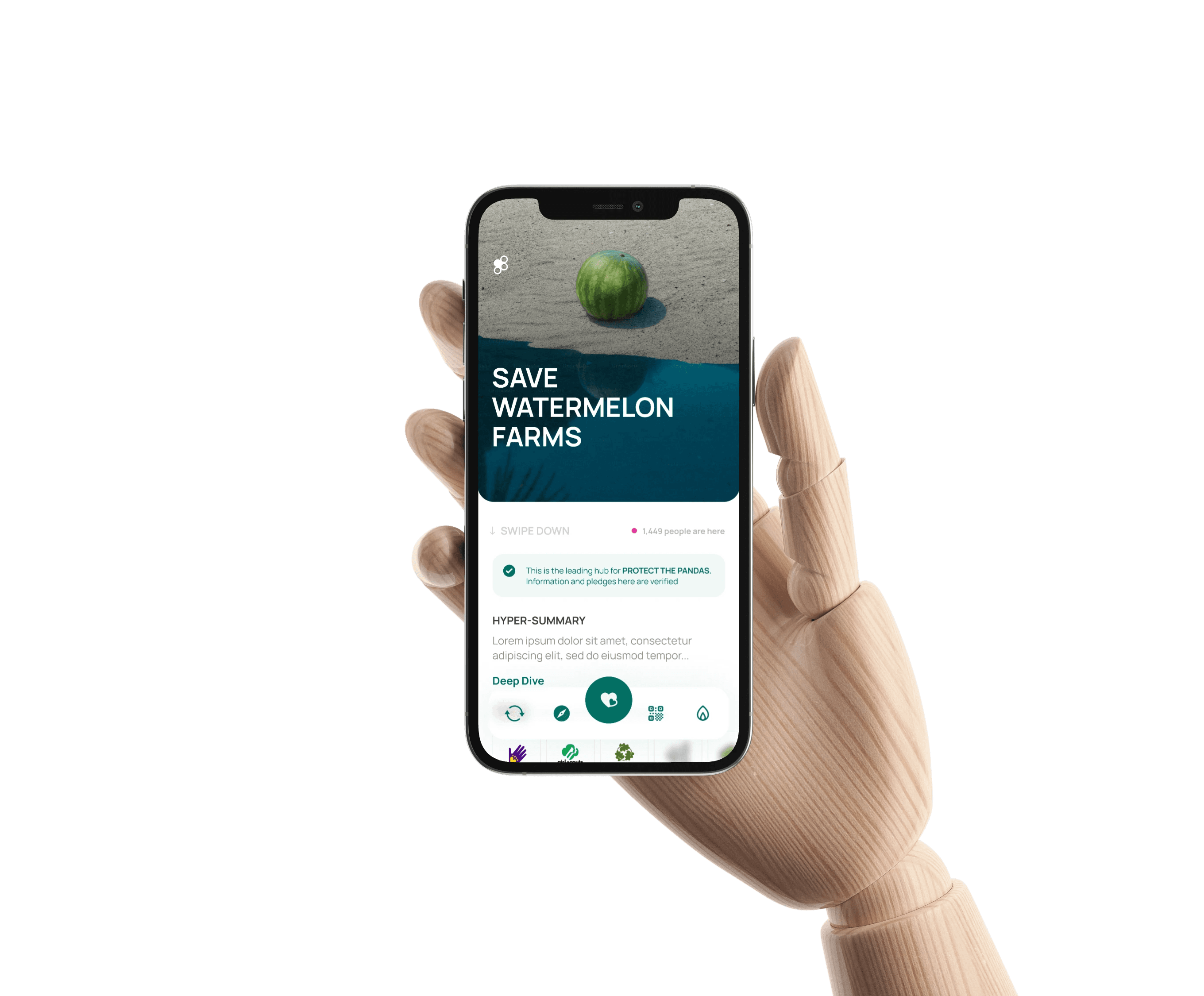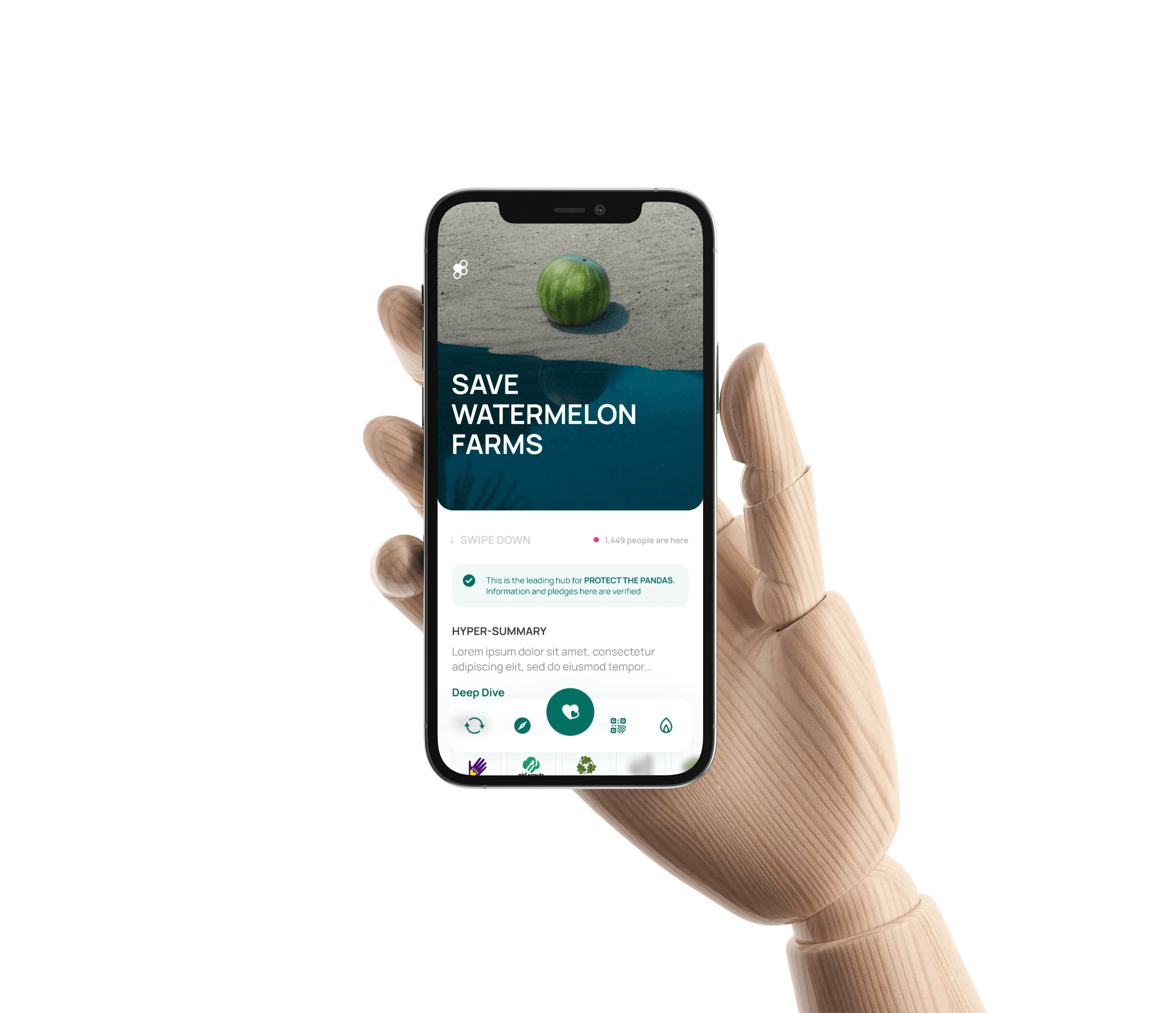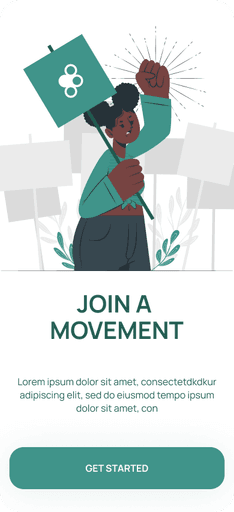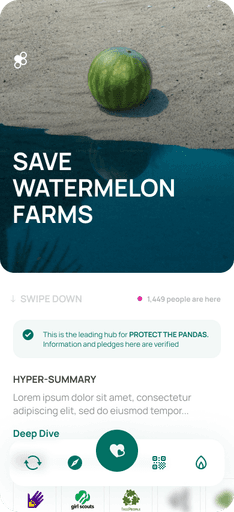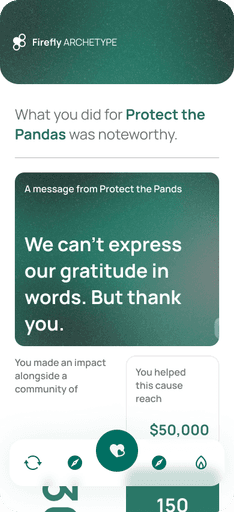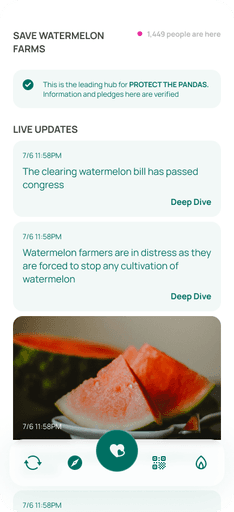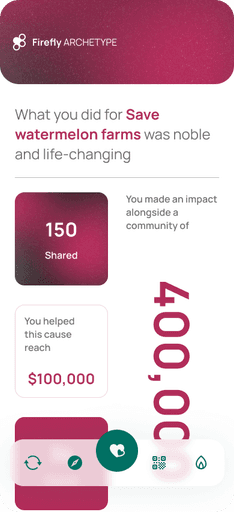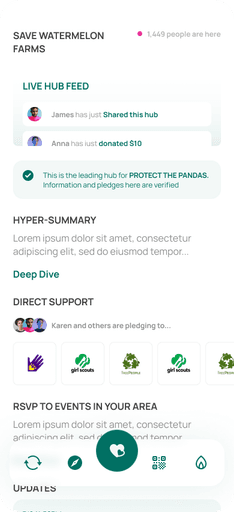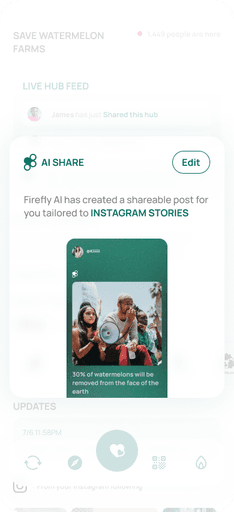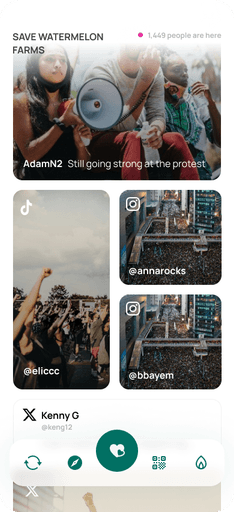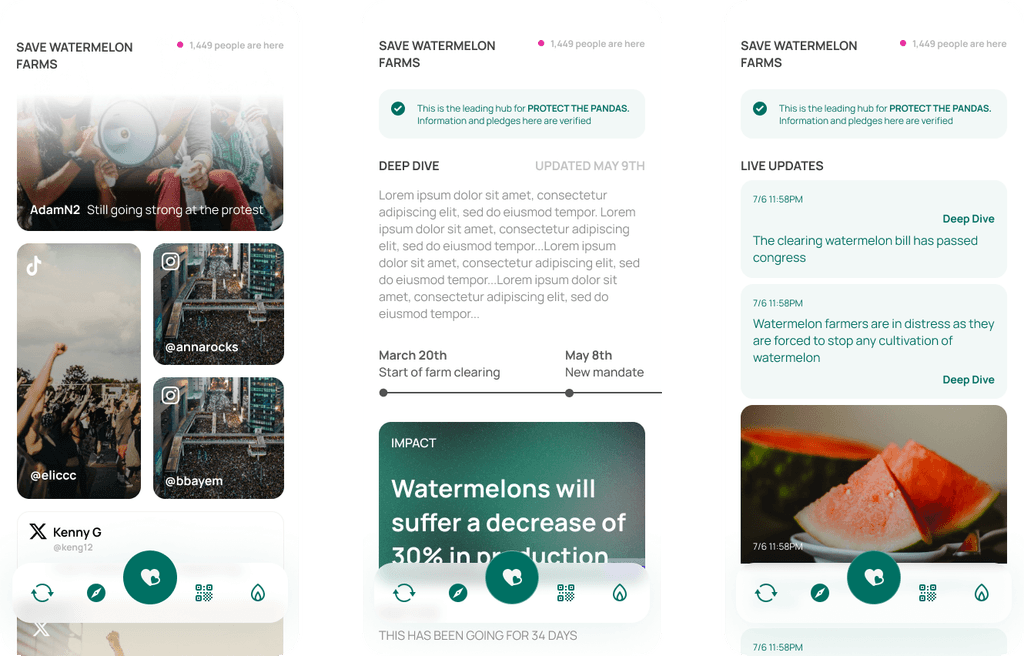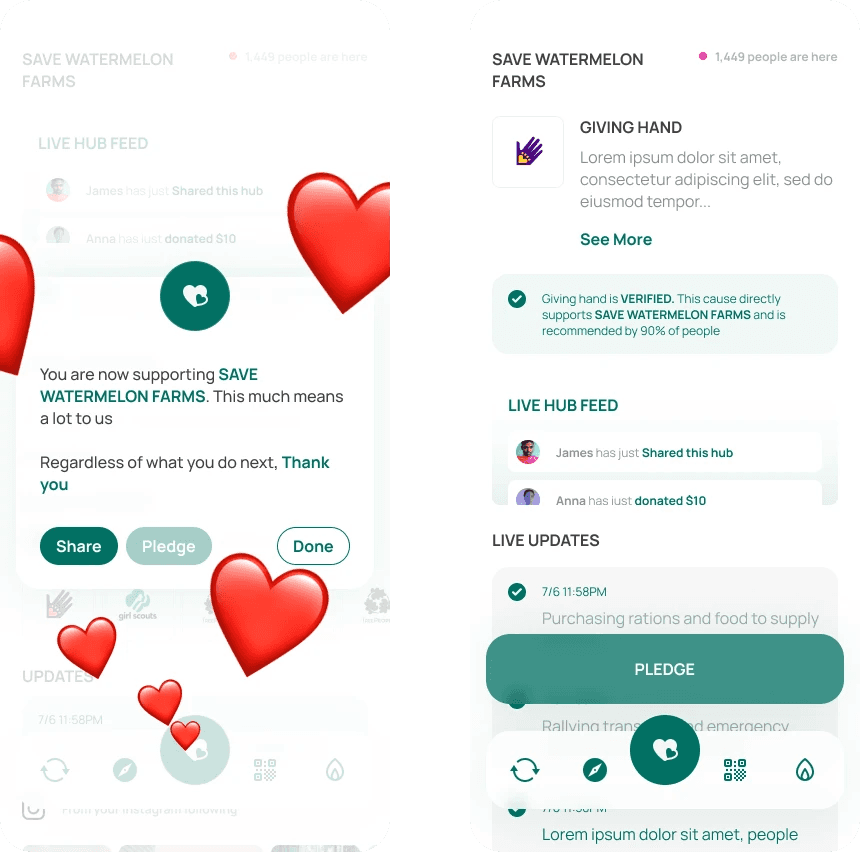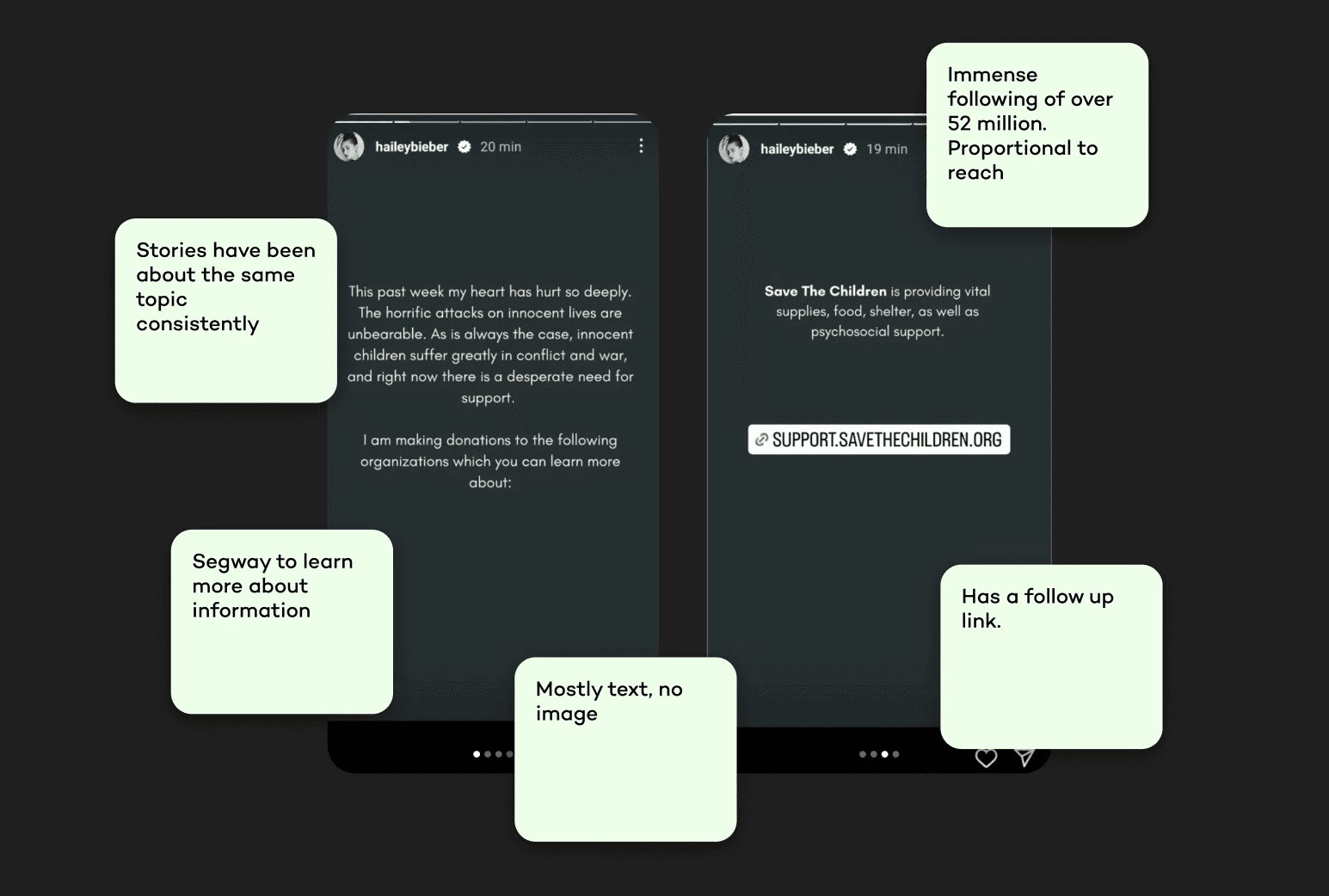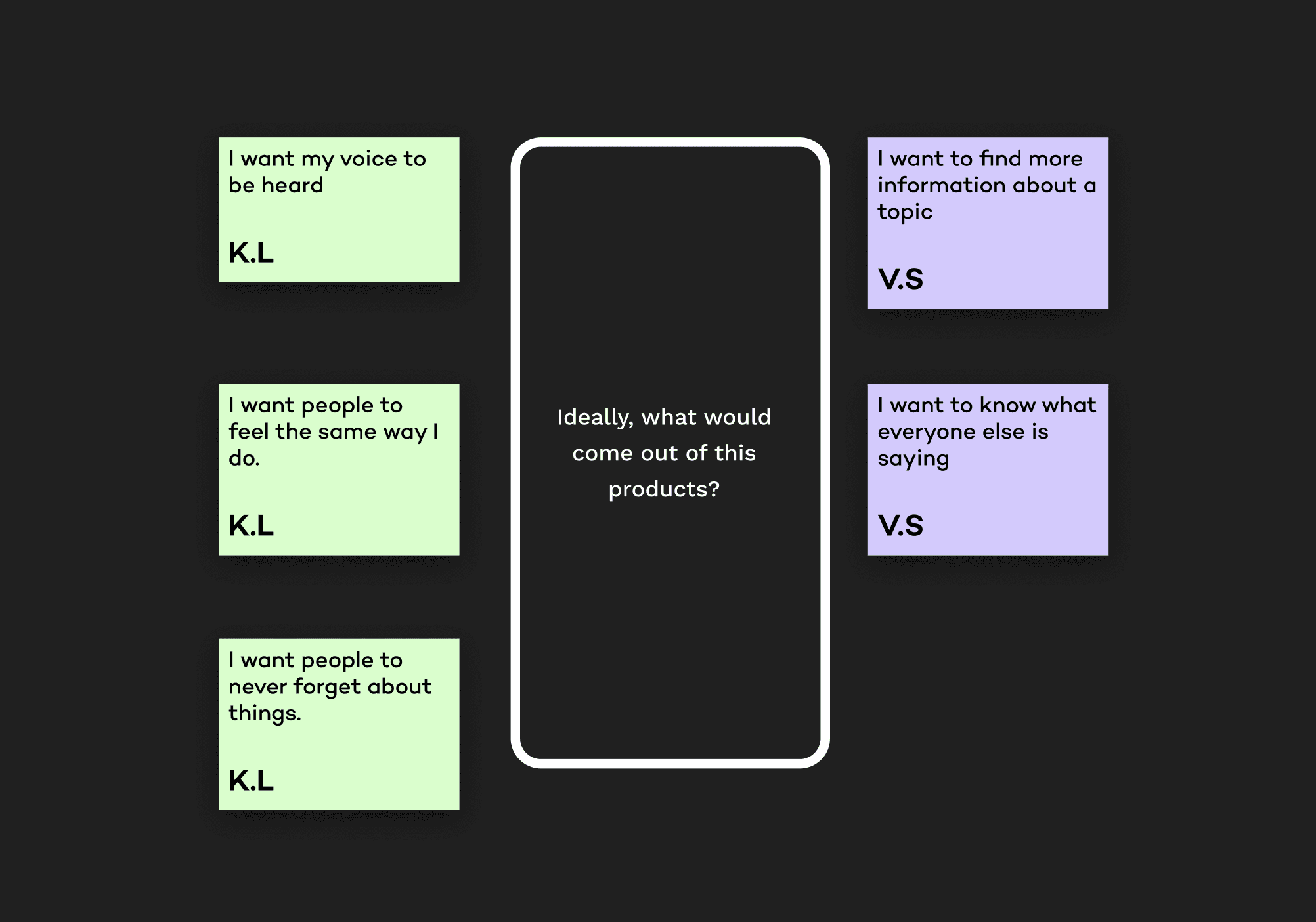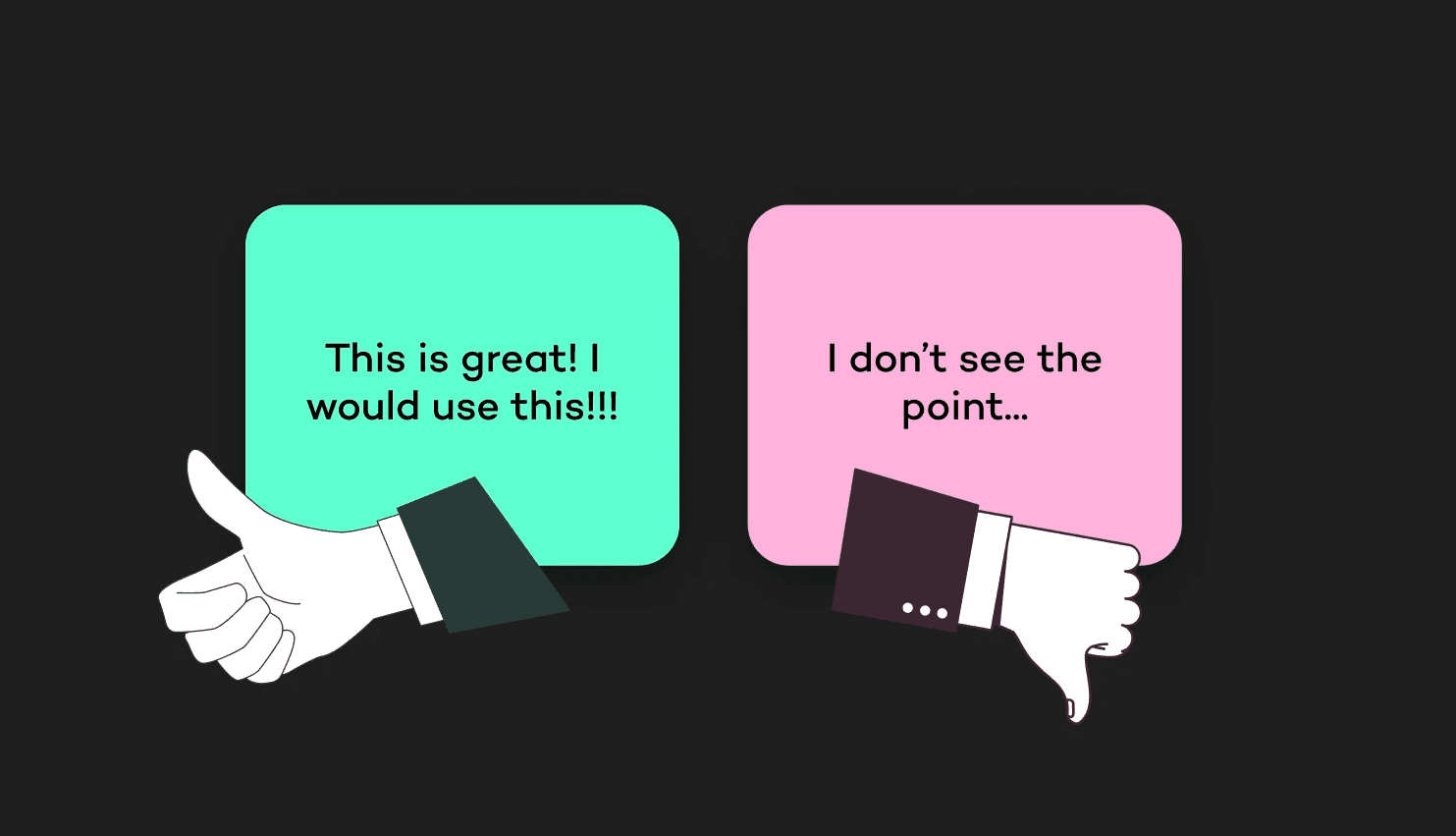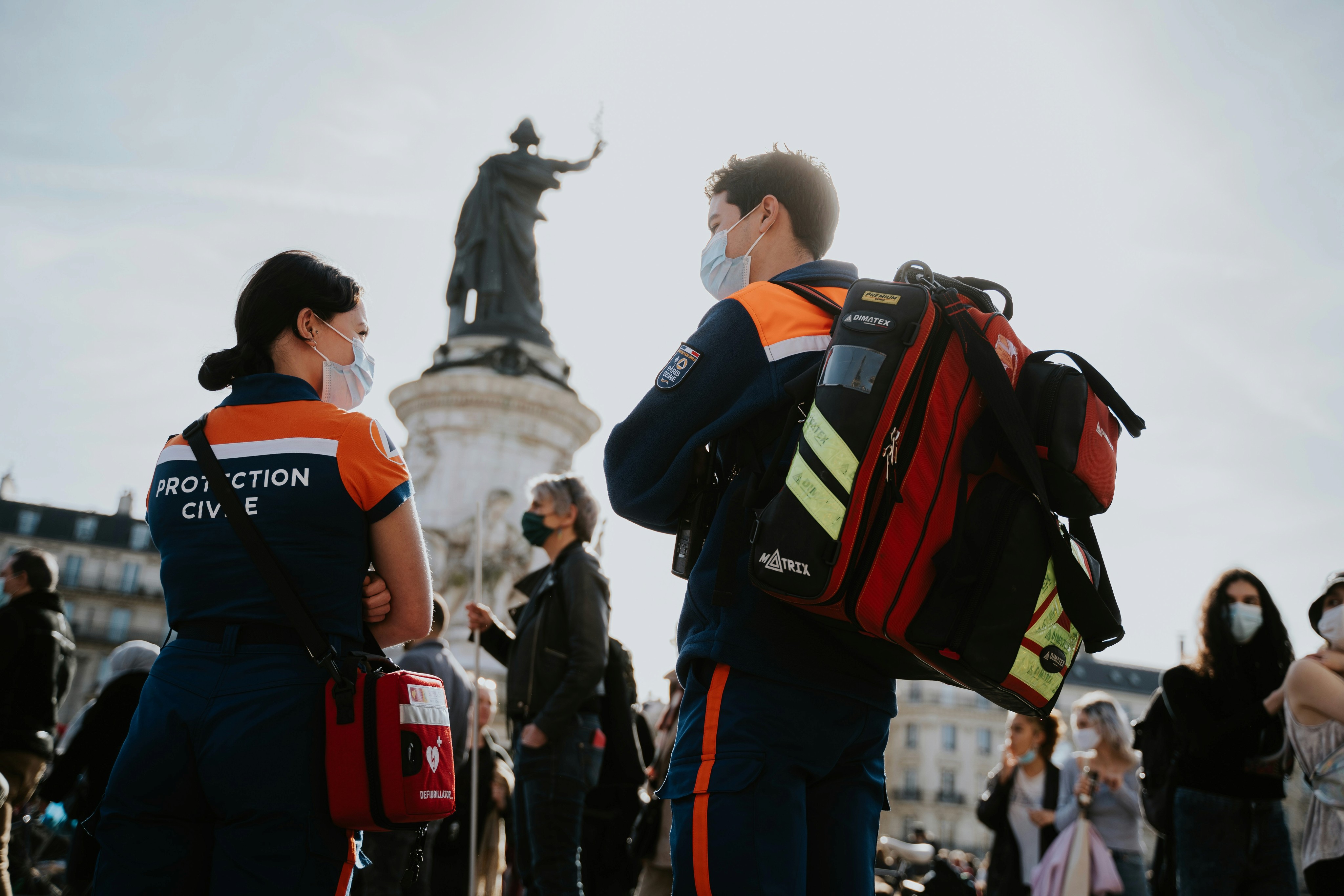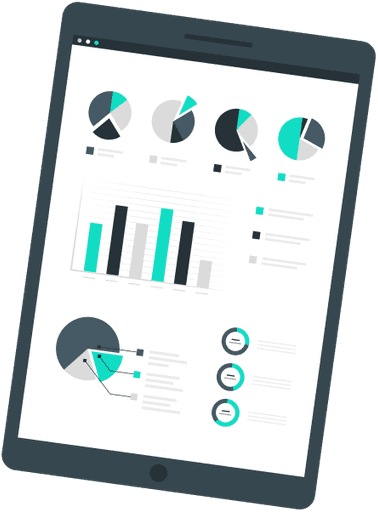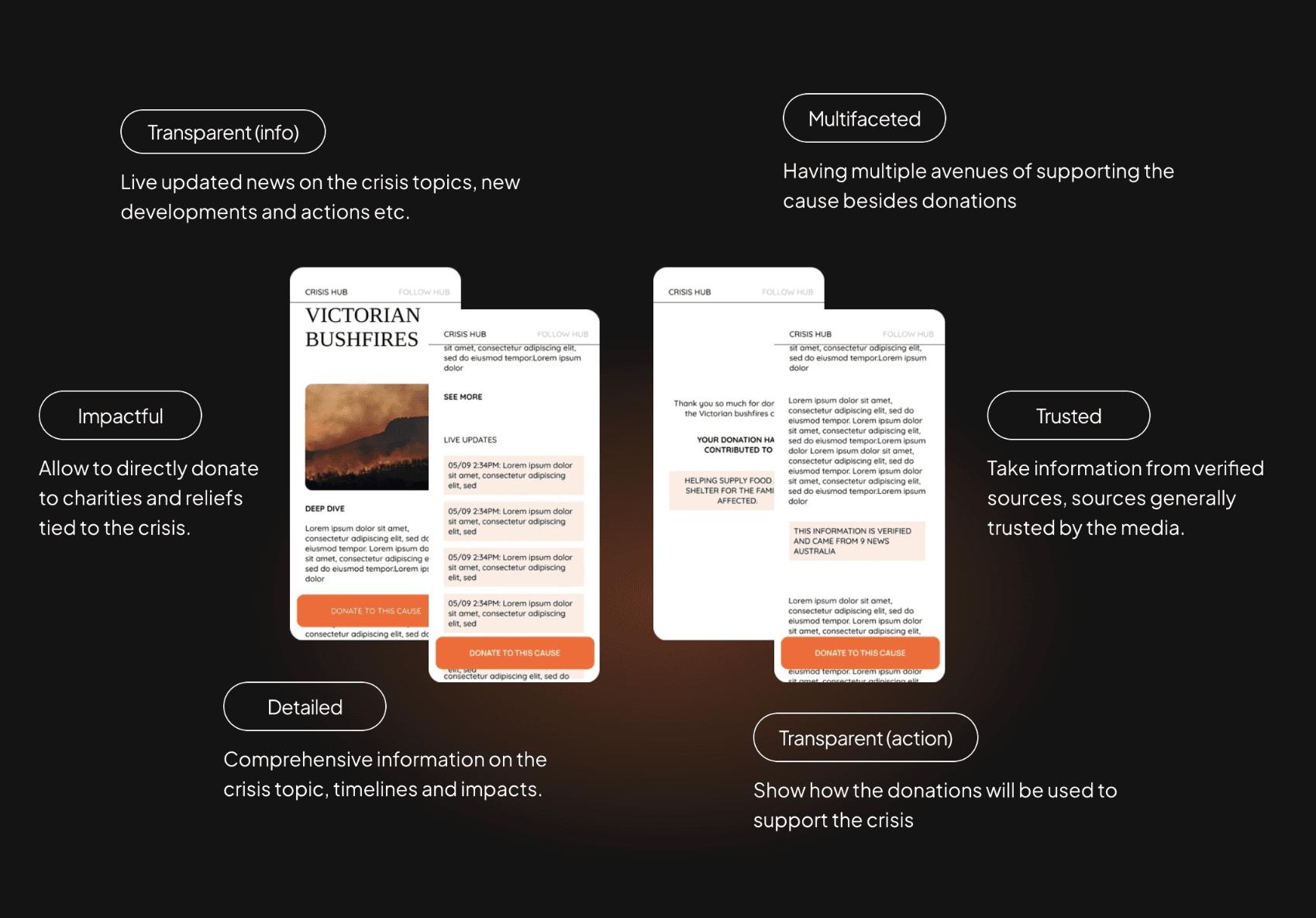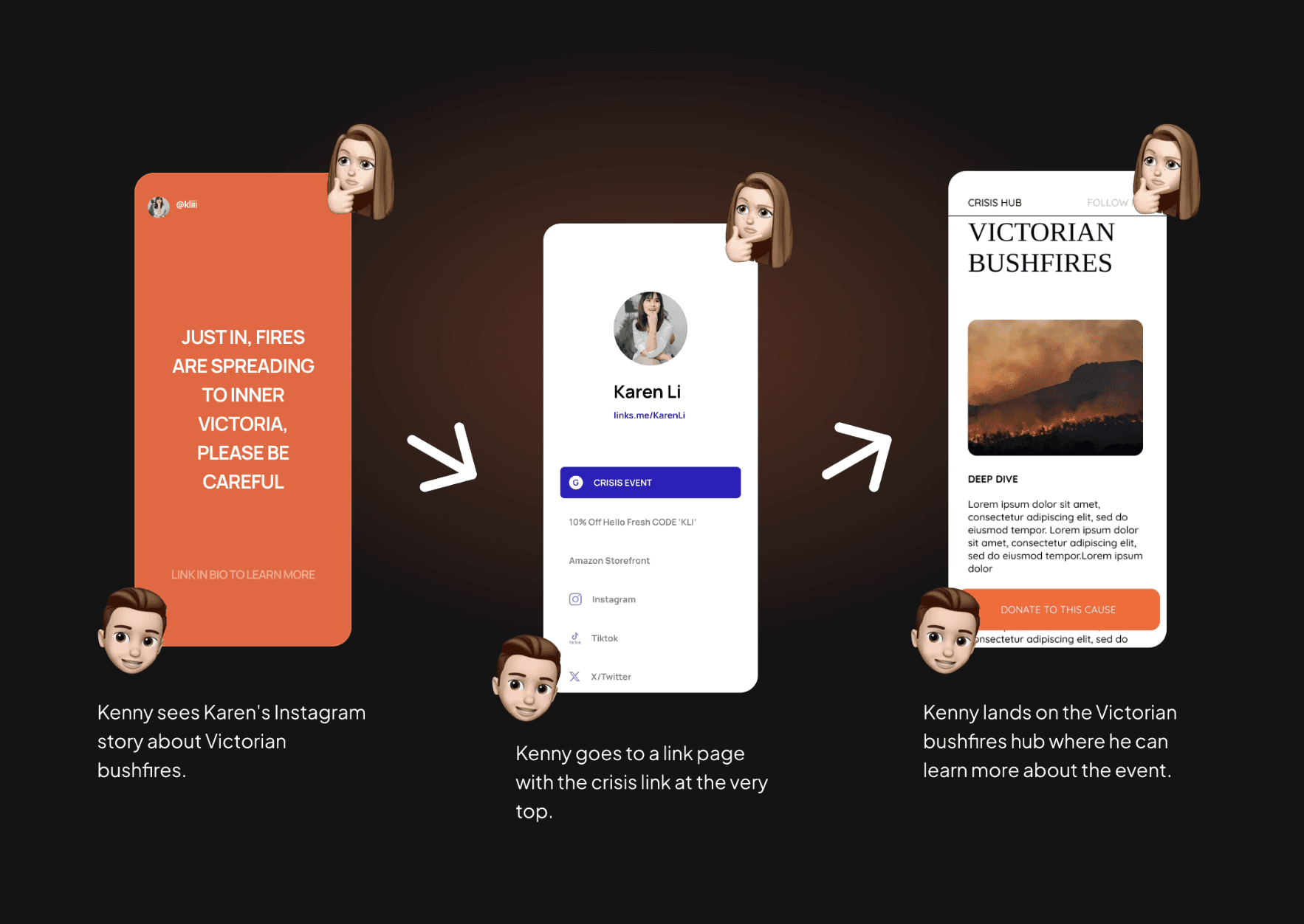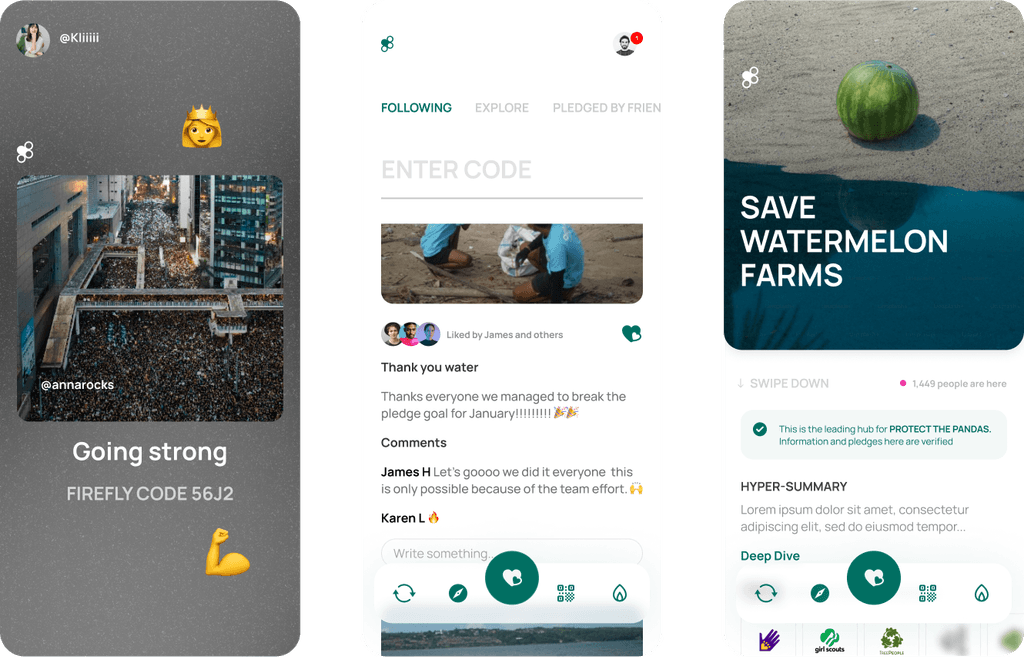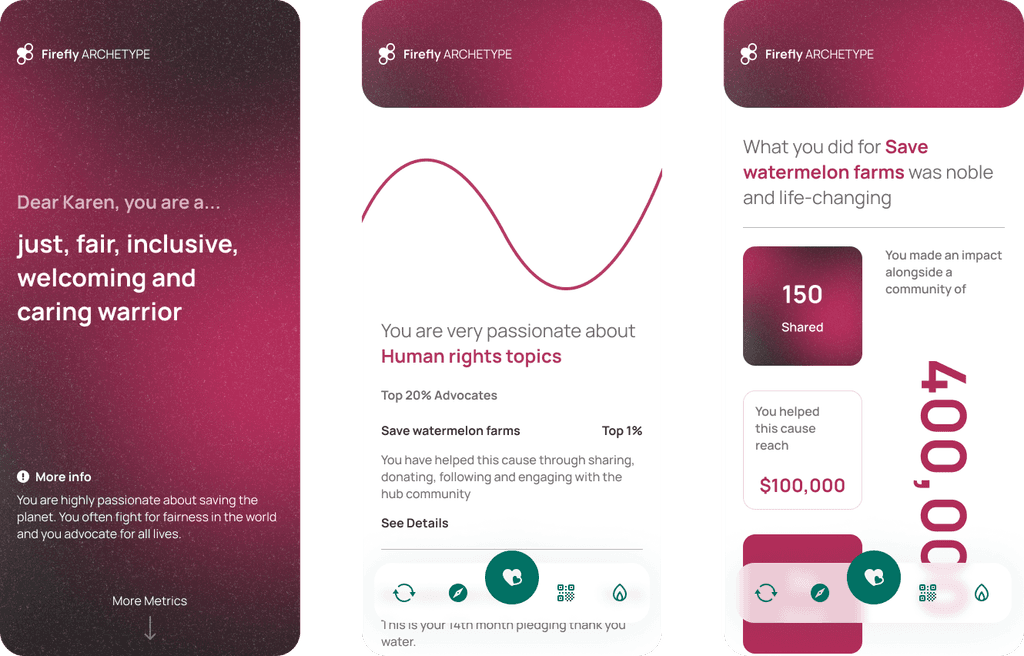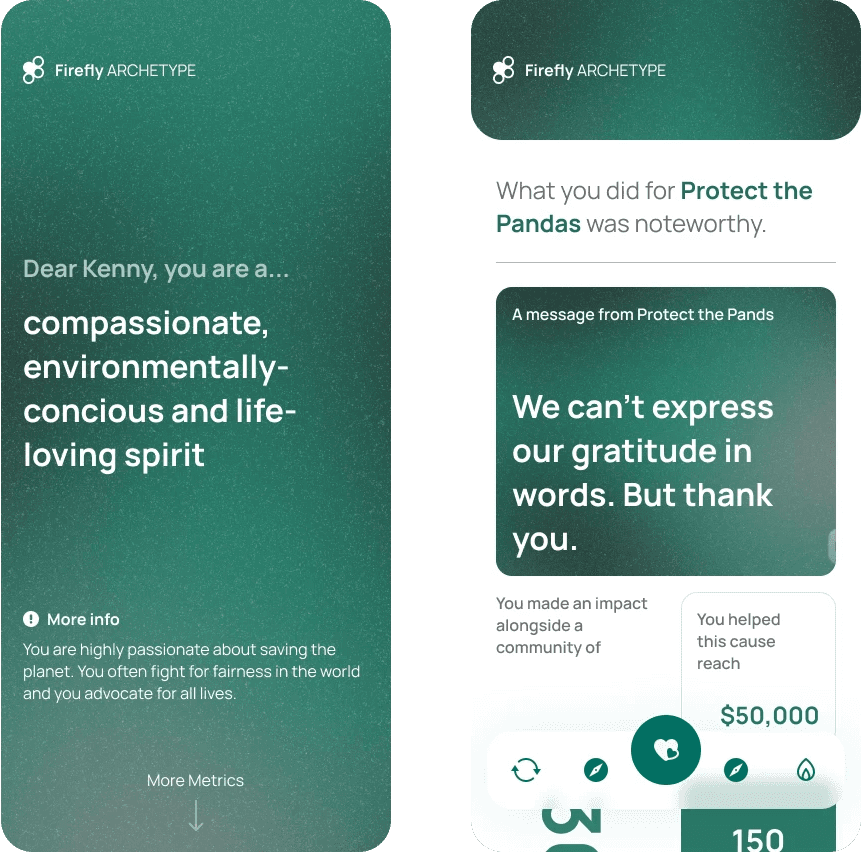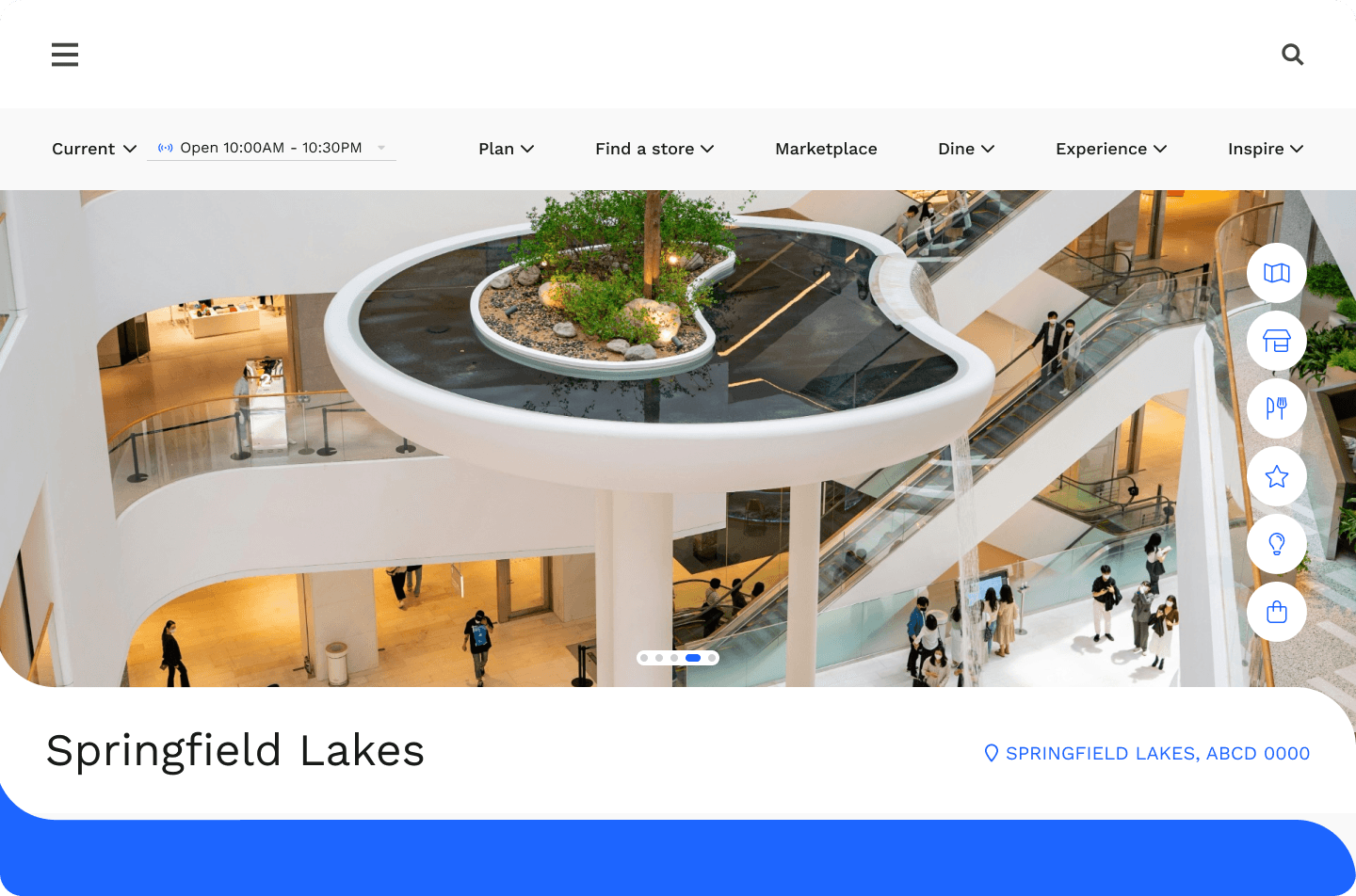Scrolling through my instagram stories, I felt uncomfortable and uneasy every time It was about something bad that happened in the world.
Scrolling through my instagram stories, I felt uncomfortable and uneasy every time It was about something bad that happened in the world.
I wanted answers. I wanted to take action.
Whenever a crisis hit the world, my Instagram feed turned into a reel of repetitive updates. With each swipe, the sense of unease only intensified. Why was this happening? What were people doing about it?
However there were a few blockers that prevented me from doing so.
No follow up links: It ended with just stories. there was no call to action or place I can look to find more information on the topic.
Contradictory information: the links provided contradictory information that differed from one source user or the next. Which one was right? Which one is the latest update?
Unclear where my money was going: There were various links to donate but they were all so different and I was not sure how my donations were being used.
Every attempt to find reliable information or avenues for action led me to dead ends. Amidst the flood of TikToks, Twitter threads, and YouTube videos, I lost sight of my purpose.
And that's when I realised I found THE gap.
Information on crisis events were fragmented, inconsistent and lacked proactiveness. There has to be a place, a central hub free from any of that.
Information on crisis events were fragmented, inconsistent and lacked proactiveness. There has to be a place, a central hub free from any of that.
A true passion project
It's personal - which is why quality and heart goes will go into the project.
Keeping it simple
Embrace familiarity with other apps. Keep it simple.
Make a difference
Going in with the mindset that if it becomes a reality it will be impactful
What did the users want? Validating the concept with the people affected by crisis events.
What did the users want? Validating the concept with the people affected by crisis events.
I needed validation and It dawned on me: who better to consult than the individual whose Instagram stories had initially inspired this idea?
Enter Karen (as we'll refer to her), a vibrant socialite with a substantial following and a fervent voice on various crisis-related topics.
Enter Karen (as we'll refer to her), a vibrant socialite with a substantial following and a fervent voice on various crisis-related topics.
She became one of our two target users: the advocate. The other target user represented individuals like myself, who may not be as outspoken but still affected by global crises - the receiver.
Uses social media religiously
Very passionate, maybe too much
Regularly uses social media
Tad oblivious but heart is in a good place
Medium netizen interaction
I did user research on the narrowed audience via various engagements such as interviews and workshops.
I did user research on the narrowed audience via various engagements such as interviews and workshops.
I had the incredible opportunity to pick the brains from a diverse range of individuals. From everyday students to working professionals, and even well-known nonprofit organisers, each interview provided valuable insights into our target audience's needs and perspectives.
30+ stories analysed
To get a sense of what both advocates and receivers have visibility of when browsing a crisis topic, I analysed over 30 stories to pick out some similarities and unique traits they include.
A deeper understanding of attributes that make a crisis post more or less impactful.
Comes from a big following
Content is informational and easy to follow
Has next steps of actions
User one-on-ones
I invited the users for an informal chat aiming to understand the participants' perspectives on global crisis events via four key aspects of feelings, behaviours, goals and understanding.
Users feel strongly about crisis topics but actions their actions can differ.
Feelings:
How strongly do you feel about this topic?
Majority of users feel strong about the specific topic. Even those less vocal about it.
Behaviours:
How do you usually come across topics like this?
Users highlighted their constant presence on social media whether regardless of being active or simply brosding
Goals:
When you see posts like these, what do you do next?
Advocates tend to either share the stories or take a more direct form of support. Whereas receivers either try to look for more information of move on with their day.
Workshops
I ran 2 workshops with the users one after the user interviews to gauge a potential solution and one after some concepts were developed to align with the users themselves
The kinds of information users want from the central hub. As well as the actions available to support a cause.
Feedback sessions
This method was primarily used for latter part of the project to gain feedback for the first product iteration. However some early responses highlighted some important figures.
Selected notable figures
75%
Of users stop taking action after viewing a story
90%
Of Advocates want their followers to sympathise with them
30%
Of users feel that the product will make less impact than intended to.
There were other interesting findings found throughout the research.
There were other interesting findings found throughout the research.
Engagement activities were proportional to level of passion
Advocates, though fewer in number, displayed a higher level of engagement compared to receivers. While advocates took proactive roles, receivers often observed, seeking clarity from advocates' messages.
Users did not start at the same level of understanding
Conversations with participants, including Karen, revealed stark differences in their reactions.
Advocates challenged with questions like "You didn't know about this?" or "What would you do in my place?" highlighted their urgency for action.
In contrast, receivers admitted to being unsure of the situation, signaling a need for awareness and understanding.
CONSOLIDATED UNDERSTANDING
Yet, regardless of differences, both advocates and receivers sought heightened awareness and support amidst crisis events which became the focus points
Yet, regardless of differences, both advocates and receivers sought heightened awareness and support amidst crisis events which became the focus points
Efficiently and seamlessly raise awareness about crisis events, ensuring everyone is informed.
The research highlighted awareness as a crucial metric due to the rapid nature of crises, where new developments arise daily, making it challenging to stay informed.
Rampant misinformation compounded the issue, bombarding individuals with conflicting information from various sources.
Yet, respondents emphasised that mere awareness of ongoing events was paramount, especially for receivers, whose sentiments on topics escalated dramatically as they became more informed. Which was really cool to see because it shows receivers slowly transition to advocates.
Provide a support launchpad that makes every step taken afterward feel special, catering to the diverse ways individuals express their support.
Support emerged as a subsequent metric, growing in importance parallel to individuals' emotional investment in a topic. Stronger emotional connections led individuals to seek impactful avenues for support, wanting reassurance that their contributions mattered.
A nonprofit charity manager echoed this sentiment, acknowledging that while donations are greatly appreciated, mere recognition of their organisation was meaningful.
Lastly, my findings highlighted a significant issue: 75% of users cease seeking information after viewing someone's story. We need to find a way to bring this number down.
Now that we know awareness and support are the main drivers for the users - the action was to tailor the platform's features to cater to both drivers.
Now that we know awareness and support are the main drivers for the users - the action was to tailor the platform's features to cater to both drivers.
An OVERLY simplified summary of the research
When people see a crisis,
they want to…
Be aware. So we provide them with-
DETAILED
I want to know what's happening
TRUSTED
Is what 's happening true?
TRANSPARENT
Is that all that's happening?
Show or get support. So we let them take-
IMPACTFUL
Will what I do make a change?
TRANSPARENT
What will happen when I take this action?
MULTIFACETED
What actions can I take?
The primary focus was on providing comprehensive information about crisis events. The hub offers multiple avenues for accessing transparent, timely information, ensuring users have all the details they need at their fingertips.
Drawing inspiration from influencers who commonly utilise link pages in their bios, consolidating sponsored products and other resources, I took that same sentiment and applied it to the flow.
With the hub and flow in place it was to start the testing journey - with a very barebones prototype.
Very passionate, maybe too much
Uses social media religiously
Regulary uses social media
Tad oblivious but heart is in a good place
Medium netizen interaction
Efficiently and seamlessly raise awareness about crisis events, ensuring everyone is informed.
The research highlighted awareness as a crucial metric due to the rapid nature of crises, where new developments arise daily, making it challenging to stay informed.
Rampant misinformation compounded the issue, bombarding individuals with conflicting information from various sources.
Yet, respondents emphasised that mere awareness of ongoing events was paramount, especially for receivers, whose sentiments on topics escalated dramatically as they became more informed. Which was really cool to see because it shows receivers slowly transition to advocates.
Provide a support launchpad that makes every step taken afterward feel special, catering to the diverse ways individuals express their support.
Support emerged as a subsequent metric, growing in importance parallel to individuals' emotional investment in a topic. Stronger emotional connections led individuals to seek impactful avenues for support, wanting reassurance that their contributions mattered.
A nonprofit charity manager echoed this sentiment, acknowledging that while donations are greatly appreciated, mere recognition of their organisation was meaningful.
Lastly, my findings highlighted a significant issue: 75% of users cease seeking information after viewing someone's story. We need to find a way to bring this number down.
Uses social media religiously
Very passionate, maybe too much
Regularly uses social media
Tad oblivious but heart is in a good place
Medium netizen interaction
IMPACTFUL
Will what I do make a change?
TRANSPARENT
What will happen when I take this action?
MULTIFACETED
What actions can I take?
Show or get support. So we let them take-
An OVERLY simplified summary of our research
When people see a crisis,
they want to…
DETAILED
I want to know what's happening
TRUSTED
Is what 's happening true?
TRANSPARENT
Is that all that's happening?
Be aware. So we provide them with-
ILLUSTRATION OF OUR FOCUS POINTS
IMPACTFUL
Will what I do make a change?
TRANSPARENT
What will happen when I take this action?
MULTIFACETED
What actions can I take?
Show or get support. So we let them take-
An OVERLY simplified summary of our research
When people see a crisis,
they want to…
DETAILED
I want to know what's happening
TRUSTED
Is what 's happening true?
TRANSPARENT
Is that all that's happening?
Be aware. So we provide them with-
ILLUSTRATION OF OUR FOCUS POINTS
Show or get support. So we let them take-
IMPACTFUL
Will what I do make a change?
TRANSPARENT
What will happen when I take this action?
MULTIFACETED
What actions can I take?
An OVERLY simplified summary of our research
When people see a crisis,
they want to…
Be aware. So we provide them with-
DETAILED
I want to know what's happening
TRUSTED
Is what 's happening true?
TRANSPARENT
Is that all that's happening?
ILLUSTRATION OF OUR FOCUS POINTS
Show or get support. So we let them take-
IMPACTFUL
Will what I do make a change?
TRANSPARENT
What will happen when I take this action?
MULTIFACETED
What actions can I take?
An OVERLY simplified summary of our research
When people see a crisis,
they want to…
Be aware. So we provide them with-
DETAILED
I want to know what's happening
TRUSTED
Is what 's happening true?
TRANSPARENT
Is that all that's happening?
ILLUSTRATION OF OUR FOCUS POINTS
I had the incredible opportunity to pick the brains from a diverse range of individuals. From everyday students to working professionals, and even well-known nonprofit organisers, each interview provided valuable insights into our target audience's needs and perspectives.
30+ stories analysed
To get a sense of what both advocates and receivers have visibility of when browsing a crisis topic, I analysed over 30 stories to pick out some similarities and unique traits they include.
A deeper understanding of attributes that make a crisis post more or less impactful.
Comes from a big following
Content is informational and easy to follow
Has next steps of actions
User one-on-ones
I invited the users for an informal chat aiming to understand the participants' perspectives on global crisis events via four key aspects of feelings, behaviours, goals and understanding.
Users feel strongly about crisis topics but actions their actions can differ.
Feelings:
How strongly do you feel about this topic?
Majority of users feel strong about the specific topic. Even those less vocal about it.
Behaviours:
How do you usually come across topics like this?
Users highlighted their constant presence on social media whether regardless of being active or simply brosding
Goals:
When you see posts like these, what do you do next?
Advocates tend to either share the stories or take a more direct form of support. Whereas receivers either try to look for more information of move on with their day.
Workshops
I ran 2 workshops with the users one after the user interviews to gauge a potential solution and one after some concepts were developed to align with the users themselves
The kinds of information users want from the central hub. As well as the actions available to support a cause.
Feedback sessions
This method was primarily used for latter part of the project to gain feedback for the first product iteration. However some early responses highlighted some important figures.
Selected notable figures
75%
Of users stop taking action after viewing a story
90%
Of Advocates want their followers to sympathise with them
30%
Of users feel that the product will make less impact than intended to.
I had the incredible opportunity to pick the brains from a diverse range of individuals. From everyday students to working professionals, and even well-known nonprofit organisers, each interview provided valuable insights into our target audience's needs and perspectives.
30+ stories analysed
To get a sense of what both advocates and receivers have visibility of when browsing a crisis topic, I analysed over 30 stories to pick out some similarities and unique traits they include.
A deeper understanding of attributes that make a crisis post more or less impactful.
Comes from a big following
Content is informational and easy to follow
Has next steps of actions
One-on-ones
I invited the users for an informal chat aiming to understand the participants' perspectives on global crisis events via four key aspects of feelings, behaviours, goals and understanding.
Users feel strongly about crisis topics but actions their actions can differ.
Feelings:
How strongly do you feel about this topic?
Majority of users feel strong about the specific topic. Even those less vocal about it.
Behaviours:
How do you usually come across topics like this?
Users highlighted their constant presence on social media whether regardless of being active or simply brosding
Goals:
When you see posts like these, what do you do next?
Advocates tend to either share the stories or take a more direct form of support. Whereas receivers either try to look for more information of move on with their day.
Workshops
I ran 2 workshops with the users one after the user interviews to gauge a potential solution and one after some concepts were developed to align with the users themselves
The kinds of information users want from the central hub. As well as the actions available to support a cause.
Feedback sessions
This method was primarily used for latter part of the project to gain feedback for the first product iteration. However some early responses highlighted some important figures.
Selected notable figures
75%
Of users stop taking action after viewing a story
90%
Of Advocates want their followers to sympathise with them
30%
Of users feel that the product will make less impact than intended to.
The proposed features did not tackle user concerns very well.
People though the designs were bland and was not very interesting.
People though the designs were bland and was not very interesting.
"Too much text, too informational…"
"Too much text, too informational…"
"What makes it different from twitter or reddit"
"What makes it different from twitter or reddit"
"What makes it different from twitter or reddit"
"What makes it different from twitter or reddit"
"Where is my money going?"
"Where is my money going?"
UC.2 FORCED SUPPORT AVENUR
People felt pressured by the big 'donate to this cause' CTA. Some don't have the capacity to do so whilst others do not want to send their money to an unknown charity.
People felt pressured by the big 'donate to this cause' CTA. Some don't have the capacity to do so whilst others do not want to send their money to an unknown charity.
It was a text overload, people felt like taking in the information was a chore.
"You can't believe everything you see on your fyp"
"You can't believe everything you see on your fyp"
UC.3 SHAKY TRUST ON INFORMATION
There were both cases of people not trusting the reported media and user driven media
There were both cases of people not trusting the reported media and user driven media
"I don't trust the media these days…"
"I don't trust the media these days…"
"It's definitely missing something"
"It's definitely missing something"
UC.4 LACKING A DIFFERENTIATOR
It was heavily compared to social media outlets like reddit and twitter.
It was heavily compared to social media outlets like reddit and twitter.
It was a text overload, people felt like taking in the information was a chore.
It was a text overload, people felt like taking in the information was a chore.
People felt pressured by the big 'donate to this cause' CTA. Some don't have the capacity to do so whilst others do not want to send their money to an unknown charity.
Before tackling these issues in the final solution, I struggled to find a way to set our product apart from others—it lacked that flare. So, I circled back to Karen for her insights. In that moment, she shared something that completely reshaped the product:
"There's not really a strong social element to it. I think it's important that you connect the users. Show that its a place for the people, by the people kind of thing y'know?".
"There's not really a strong social element to it. I think it's important that you connect the users. Show that its a place for the people, by the people kind of thing y'know?".
And that was the eureka moment. The immediate approach, focusing solely on individual journeys, left gaps and doubts. I had to transform the hub into a community-driven platform, where users could connect, become aware, and support crises collectively. Thus, the new design prioritised communal interactions, fostering a sense of togetherness and shared purpose.
Firefly - a guiding light in the darkness of a crisis
Firefly is both a mobile and web application designed to serve as a central hub, linking individuals to comprehensive information, avenues for support, and a community dedicated to addressing ongoing crisis events.
Many users find themselves intrigued by social media posts about current crises but lack a platform for deeper understanding. Our aim is to bridge that gap, connecting users to the most reliable and informative resources available, fostering empathy, knowledge and action.
Want to be in the loop of an ongoing crisis? You can use Firefly to quickly get to an information hub by entering a unique pin, scanning a QR code or clicking a generated link.
I switched up the UI to a sleek and modern look, familiar to the regular apps you use daily
Familiarise yourself with a deep dive of the crisis from verified sources and check live updates on the latest reported developments on a firefly hub.
Don't trust the media? Worry not because all of the information on the hub is rated by the community; like minded users who are coming together to support the cause.
UC.3 SHAKY TRUST ON INFORMATION
You get the best of both worlds. Verified sources and sources rated by the community.
Information delivered in bite-sized pieces between all the other cool things that we're gonna add
In Firefly, showing your support to a crisis is more than just another social media heart. It is broadcasted and heard by community; whether you choose to heart a crisis or donate directly to the cause, it all makes an impact.
Firefly is linked to charities, appeals, and relief efforts that not only aid in addressing the crisis but also provide transparent documentation of their actions right back to the app. This ensures that your support is making a tangible difference where it's needed most.
UC.2 FORCED SUPPORT AVENUE
You don't have to donate, We want to make the gravity of your support in other ways just as heavy. But if you choose to do so, we will make sure your are thanked and that your donation has a transparent journey.
Firefly leverages AI to craft social media-ready posts, seamlessly integrating live updates, statistics, community actions, and general information about a crisis. With just a tap of the "add to story" button, users can effortlessly share meaningful content across different social media platforms. Whether it's a heartfelt call to action, an informative update, or a powerful statistic, your 'Fireflyer' ensures that your message resonates effectively across various social media landscapes
Every action you take in Firefly is meticulously recorded, and your impact is reflected back to you in a heartfelt thank-you letter, reminiscent of Spotify Wrapped. This personalised letter showcases the profound effect you've had on the lives of those affected by crises, whether they're victims, community members, or that unknown follower who may one day become a user of firefly. It provides insight into the kind of person you are and celebrates the positive change you've brought to the world.
After a final albeit short round of testing post-change, it's clear: the design is way better now, and even if the fixes toward all the mentioned user concerns wasn't a 100%, I addressed it regardless. People are saying the app feels more "important" because of the new features and overall purpose is more clear than ever.
One participant (advocate) even asked if I was ever planning to make an MVP from this, because they want to start using it right away!
Unlike its contemporaries, Firefly is the best at getting the people to the information they need
100%
AGREED UI HAS BEEN IMPROVED
100%
OF INTERVIEWED PARTICIPANTS WOULD USE IT IF IT WAS AVAILABLE ON THE APP STORE RIGHT NOW
The project was evaluated on three key metrics: problem paradox (how effectively we addressed the issue at hand), UX/UI design (the overall look and feel of the app), and data quality (including interviews, surveys, and research findings).
They acknowledged Firefly as a novel concept, effectively addressing a contemporary problem.
However, they prompted us to delve deeper into its long-term sustainability, especially regarding hub management. While they appreciated the execution, they suggested further development of certain features.
In hindsight, I wasn't bummed out about the placing as i believe it really did have the potential to change the world for the better.
"Especially with all that's going on in today's world like what's happening on the news, I can see this really making an impact."
Get with the CONVERSATION
Get with the CONVERSATION
Get with the CONVERSATION
Get with the CONVERSATION
In Firefly, showing your support to a crisis is more than just another social media heart. It is broadcasted and heard by community; whether you choose to heart crisis or donate directly to the cause, it all makes an impact.
Firefly is linked to charities, appeals, and relief efforts that not only aid in addressing the crisis but also provide transparent documentation of their actions right back to the app. This ensures that your support is making a tangible difference where it's needed most.
UC.2 FORCED SUPPORT AVENUE
You don't have to donate, We want to make the gravity of your support in other ways just as heavy. But if you choose to do so, we will make sure your are thanked and that your donation has a transparent journey.
Want to be in the loop of an ongoing crisis? You can use Firefly to quickly get to an information hub by entering a unique pin, scanning a QR code or through a generated link.
We've switched up the UI to a sleek and modern look, familiar to the regular apps you use daily
